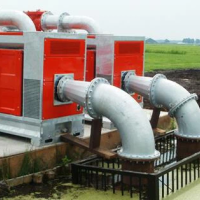“Energy efficiency monitoring system of operated irrigation pumping stations in Uzbekistan”
“ENERGY EFFICIENCY MONITORING SYSTEM OF OPERATED IRRIGATION PUMPING STATIONS IN UZBEKISTAN”
Subproject ID: REP-23112021/18
Grant Agreement #: REP-1/1
Subproject title: “Energy efficiency monitoring system of operated irrigation pumping stations in Uzbekistan”
Duration: 10.08.2024-10.08.2024 y.
In Uzbekistan, out of 4.3 million hectares of irrigated land, 2.3 million hectares (53%) are supplied with water by 1,693 pumping stations, which are on the balance sheet of the Ministry of Water Management with an annual electricity consumption of 8-8.2 billion kWh. The problem is that at operated irrigation pumping stations, energy consumption is taken into account manually, most of them do not have accurate metering devices for water supply that could take into account the amount of sediment coming with water. As a result, there is no possibility of monitoring the energy efficiency of the pumping station in real time. In addition, irrigation pumping stations consume 1-3% of electricity from the total annual consumption for their own needs. All this leads to an increase in annual electricity consumption by pumping stations. The purpose of the project is to scientifically substantiate, develop and implement the system for monitoring the energy efficiency of operated irrigation pumping stations, providing information on the pumped flow rate and water turbidity, the amount of electricity consumed for this in real time, as well as an complex photovoltaic system for energy supply of personal needs of pumping stations and installed metering devices.
Based on the objectives of the project, the following tasks were set:
1. To carry out the production of the necessary series of smart devices for water consumption accounting, developed by the project participants.
2. Develop software for the online system for monitoring the energy efficiency of pumping stations, as well as a mobile application for water management workers and farmers to inform about the water consumption supplied by pumping stations at the moment.
3. Install smart devices to account for water consumption and turbidity of the flow at the planned 29 irrigation pumping stations.
4. On the basis of scientific and feasibility studies, install photovoltaic power plants to meet the personal needs of each of the 29 large pumping stations
5. To determine scientifically sound energy-efficient operating modes for each of the selected 29 pumping stations.
6. Implement the developed energy efficiency monitoring system at pumping stations.
7. To test the implemented monitoring system during the operation of pumping stations during the vegetation season.
Implementation objects: 29 large pumping stations in seven regions of the republic, such as pumping stations "Alat", "Soktari", "Yomonjar", "Karakul", "Paykent" and "Jondor-3" in Bukhara region, "Kanimeh-1", "Urtachul" and "Navoi" in Navoi region, "Amu-Zang-1", "Amu-Zang-2", "Babatag", "Jaykhun" and "Sherabad" in Surkhandarya region, "DGNS", "DNS-2" and "DNS-3" in Jizzakh region, "Obi-Khayat", "Raish-Hakent-1", "Ulugnar", "Gulbakhor-1p", "Asaka-Adir", "Raish-Hakent-2" and "Guliston" in Andijan region, "Namangan", "Buloqboshi" and "Rezaksoy-3" in Namangan region, as well as "Furkat-1" and "Dangara" in Fergana region. These large irrigation pumping stations with great economic and strategic importance for their regions. Currently, all other irrigation pumping stations are gradually connected to the online monitoring system.
Based on the purpose and objectives of the research, the following scientific and technical solutions have been implemented:
1. The survey has been conducted of 29 large irrigation pumping stations.
2. The design of the intelligent device for accounting of water consumption has been developed, manufactured and implemented at irrigation pumping stations.
3. Software has been developed for the online energy efficiency monitoring system of pumping stations, as well as the mobile application for water management workers and farmers for online information about water consumption in machine channels supplied by pumping stations.
4. Intelligent metering devices for the flow of pumped water and its turbidity have been installed at 29 large irrigation pumping stations.
5. Based on scientific and feasibility studies, mobile photovoltaic systems have been installed to cover the personal needs of each of the 29 large pumping stations.
6. Scientifically justified and recommended energy-efficient operating modes for each of the selected 29 large pumping stations.
7. The energy efficiency monitoring system of pumping stations has been installed and implemented.
8. The implemented monitoring system has been tested during the vegetation season.



